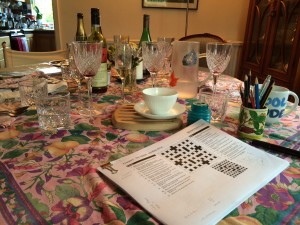Daily Archives: May 11, 2014
Big screens, small houses
I was a TV critic for 13 years (1982-87 on the Listener, now sadly defunct; 1987-95 on the Observer, still going strong), so I feel I’ve paid my dues to the medium. I still watch TV occasionally, but rarely while it’s being broadcast (which is why, for me, the BBC iPlayer was such a great innovation). It’s “my schedule, not the scheduler’s schedule” now. And because I watch TV on devices other than ‘television sets’ I’ve paid very little attention to how the consumer market has developed over the last decade or so.
But the the other day I found myself walking through the local branch of John Lewis while en route to somewhere else and I found myself in the audio-visual department, where I was surrounded by gigantic screens. And then I was struck by the irony of what’s happening. All over the country, developers are building new apartments consisting of ever-smaller rooms, while at the same time manufacturers are building ever-bigger flat-screen TVs. If these two trends continue then we are on course for an interesting collision.
And then I stumbled on this nice piece by Douglas Coupland, in which he writes
big-screen TVs are ugly. In the history of human technology, there have been few inventions whose intrinsic ugliness and brutality of form defy all notions of beauty and defeat everything we call “home”.
Trying to put a big screen in a domestic space and have it look natural is almost impossible, like having a 2001: A Space Odyssey monolith inserted into your life – a monolith that has total disregard for your humanity or taste. The black minimalist box on your wall negates your framed wedding photos, your cornices, your art collection, your potted plants. The only environment it looks passably OK in is a modern house built after 2008 that factors in the bizarre scale of big screens – and even then, when you see one passably installed, you feel like you’ve walked into Muammer Gaddafi’s bedroom.
Yep.
Our Kafkaesque world
This morning’s Observer column.
When searching for an adjective to describe our comprehensively surveilled networked world – the one bookmarked by the NSA at one end and by Google, Facebook, Yahoo and co at the other – “Orwellian” is the word that people generally reach for.
But “Kafkaesque” seems more appropriate. The term is conventionally defined as “having a nightmarishly complex, bizarre, or illogical quality”, but Frederick Karl, Franz Kafka’s most assiduous biographer, regarded that as missing the point. “What’s Kafkaesque,” he once told the New York Times, “is when you enter a surreal world in which all your control patterns, all your plans, the whole way in which you have configured your own behaviour, begins to fall to pieces, when you find yourself against a force that does not lend itself to the way you perceive the world.”
A vivid description of this was provided recently by Janet Vertesi, a sociologist at Princeton University. She gave a talk at a conference describing her experience of trying to keep her pregnancy secret from marketers…

